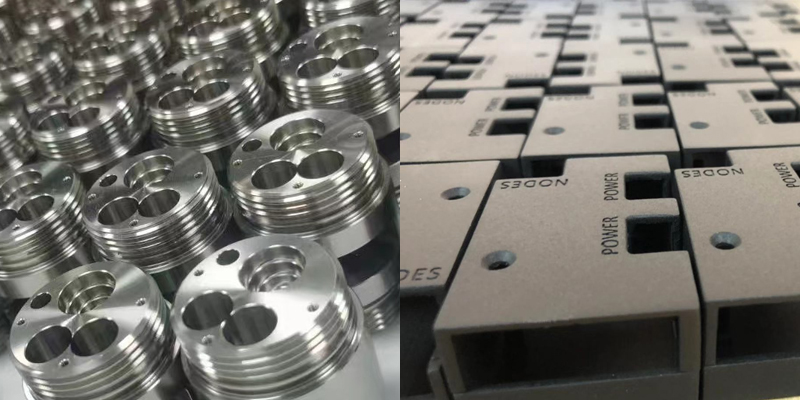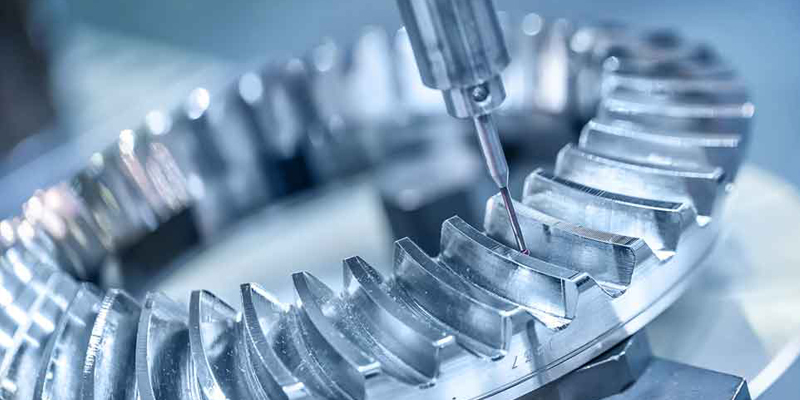Introduction
5-axis metal machining stands at the forefront of modern manufacturing technology, offering unparalleled precision and efficiency. This cutting-edge process has revolutionized the way industries approach complex component design and production. This article delves into the world of 5-axis machining, exploring its capabilities, benefits, applications, and future implications in the manufacturing sector.
What is 5-Axis Metal Machining Services?
5-axis machining refers to the ability of a CNC machine to move a part or a tool on five different axes simultaneously. Traditional machining operates on three axes (X, Y, and Z), but 5-axis CNC machines add rotation around the X-axis (A-axis) and the Y-axis (B-axis), enhancing their capability to create complex and intricate shapes with high precision.
Key Capabilities of 5-Axis Machining Services
Complex Geometries: Ability to produce parts with complex geometries and intricate details.
Single Setup: Multiple sides of a part can be machined in a single setup, reducing setup time and improving precision.
Improved Tool Life: Efficient tool paths and angles increase tool life and reduce wear.
Better Surface Finish: Enhanced control allows for smoother surface finishes, reducing the need for secondary processing.
Commonly materials application in 5-axis CNC Machining Services
Material Type | Key Properties | Common Uses in 5-Axis Machining |
Aluminum | Lightweight, good machinability, corrosion-resistant | Aerospace components, automotive parts, prototypes |
Stainless Steel | Corrosion-resistant, high strength, good machinability | Medical devices, food processing equipment, marine applications |
Titanium | High strength-to-weight ratio, corrosion-resistant | Aerospace parts, medical implants, high-performance automotive |
Plastics (e.g., Nylon, ABS) | Lightweight, varying degrees of strength and flexibility | Prototypes, non-critical parts, consumer products |
Copper and Brass | Good conductivity, malleability, corrosion resistance | Electrical components, decorative items, heat exchangers |
Carbon Steel | High strength, relatively low cost, good machinability | Heavy machinery, automotive components, structural applications |
Tool Steel | High hardness, wear resistance, able to maintain sharp edge | Cutting tools, molds, dies, punches |
Polycarbonate | High impact strength, transparent, good machinability | Protective covers, lenses, insulators |
Acrylic | Transparent, excellent optical clarity, easy to machine | Optical devices, display cases, prototypes |
PEEK (Polyether Ether Ketone) | High temperature resistance, chemical resistant | Medical implants, aerospace components, high-performance parts |
Advantages of GD-HUB's 5-Axis Machining Services
Reduced Lead Time: Single setup machining reduces overall production time.
Cost-Effective: Minimizes waste and reduces labor costs through efficient machining.
Versatility: Suitable for a wide range of materials, including metals, plastics, and composites.
Increased Precision and Accuracy: Allows for tighter tolerances and higher precision in complex parts.

General guidelines for tolerances in 5-axis machining:
Standard Tolerances: For many applications, a general tolerance of ±0.005 inches (±0.127 mm) is common. However, this can vary based on the factors mentioned.
High-Precision Tolerances: In high-precision applications, such as aerospace or medical devices, tolerances can be much tighter, often within ±0.002 inches (±0.05 mm) or even tighter.
Material Considerations: Different materials have different properties that can affect machining precision. For example, softer materials like aluminum might allow for tighter tolerances compared to harder materials like titanium or stainless steel.
Machine Calibration and Maintenance: The condition and calibration of the 5-axis machine also play a significant role. Well-maintained and regularly calibrated machines can achieve and maintain tighter tolerances.
Part Complexity: The complexity of the part being machined can affect achievable tolerances. More complex parts may require more precise control and potentially tighter tolerances.
Surface Finish: Tolerance levels might also depend on the required surface finish. A smoother finish often requires tighter tolerances.
Material Type | General Tolerance (±) |
Aluminum | 0.005" - 0.015" (0.127 mm - 0.381 mm) |
Steel | 0.005" - 0.015" (0.127 mm - 0.381 mm) |
Stainless Steel | 0.005" - 0.015" (0.127 mm - 0.381 mm) |
Titanium | 0.005" - 0.015" (0.127 mm - 0.381 mm) |
Plastics (e.g., ABS, Nylon) | 0.005" - 0.020" (0.127 mm - 0.508 mm) |
High Precision Applications | 0.002" - 0.005" (0.05 mm - 0.127 mm) |
Please note:
· These ranges are general estimates and can vary significantly depending on the specific circumstances of a machining project.
· High precision applications (like aerospace or medical components) often require tighter tolerances.

5-axis machining of automotive impellers
Applications of GD-HUB's 5-Axis Machining Services
Aerospace: Used for manufacturing aerodynamic components and turbine parts.
Automotive: Ideal for creating complex engine components and prototypes.
Medical: Produces intricate and precise medical devices and implants.
Mold and Die Making: Enables production of complex molds with intricate details.
Industry | Applications of 5-Axis Machining Parts |
Aerospace | Turbine blades, structural components, engine casings, and intricate airframe parts. |
Automotive | Engine components, transmission parts, and complex suspension components. |
Medical | Orthopedic implants, surgical instruments, and medical devices with complex geometries. |
Defense and Military | Components for defense systems, drones, and precision-guided munitions. |
Energy (Oil & Gas, Renewables) | Parts for turbines, drilling equipment, and components for renewable energy systems. |
Die and Mold Making | Molds and dies for injection molding, forging, and die-casting applications. |
Electronics | Complex housings, heat sinks, and connectors with high precision requirements. |
Marine | Propellers, engine parts, and specialized fittings for ships and submarines. |
Tool and Machinery Manufacturing | Custom tools, jigs, fixtures, and machinery components requiring high precision. |
Research and Development | Prototype parts for various industries, requiring unique shapes and precise dimensions. |
The Future of 5-Axis Machining in Manufacturing
The future of 5-axis machining is bright, with continuous advancements in CNC technology, software, and materials. As industries strive for more complex and lightweight designs, the demand for 5-axis machining is expected to grow. This technology plays a crucial role in the future of manufacturing, driving innovation in various sectors.
The future of 5-axis machining in manufacturing is poised to be increasingly influential, driven by advancements in technology and evolving industry needs. An overview of the key trends and developments that are likely to shape the future of 5-axis machining:
Integration with Advanced Technologies
Increased Automation and Smart Manufacturing
Enhanced Software and Simulation Tools
Customization and Small Batch Production
Lightweight and Compact Machine Design
Use in Diverse Industries
Training and Skill Development
Sustainability and Energy Efficiency
Enhanced Material Capabilities
Global Supply Chain Integration
Conclusion
5-axis metal machining represents a significant leap in manufacturing technology, offering unprecedented precision and efficiency. Its ability to create complex geometries in a single setup makes it a valuable tool in various industries. As technology continues to evolve, the capabilities and applications of 5-axis machining are set to expand, further revolutionizing precision engineering.
Choosing a reliable precision manufacturer is crucial in various industries, especially those requiring high levels of accuracy and quality, such as aerospace, medical, automotive, and defense.
GD-HUB brings to you:
Quality Assurance: Precision manufacturing demands the highest standards of quality. GD-HUB ensures that products meet stringent specifications and are free from defects, which is vital in industries where product failure can have serious consequences.
Advanced Technology and Expertise: Reliable manufacturers invest in advanced technology and maintain a skilled workforce. GD-HUB expertise in precision manufacturing techniques ensures that even the most complex or intricate designs are realized accurately.
Consistency and Reliability of Products: Consistent quality is essential in precision manufacturing. GD-HUB ensures that each part or product is consistently produced to the same exacting standards, which is critical for applications where components need to interact seamlessly.
Cost-Effectiveness: While precision manufacturing might seem expensive, GD-HUB can offer cost-effectiveness in the long run. This is achieved through efficient production processes, minimizing waste, and reducing the likelihood of costly errors or reworks.
Timely Delivery: In many industries, time is of the essence. GD-HUB have efficient production processes and good supply chain management, ensuring timely delivery of products.
Compliance with Standards and Regulations: Precision manufacturers must often comply with various industry-specific standards and regulations. GD-HUB ensure that products are compliant, avoiding legal and safety issues for their clients.
Innovation and Continuous Improvement: GD-HUB is often at the forefront of innovation, continually improving their processes and adopting the latest technologies and practices. This approach can provide clients with a competitive edge in their respective markets.
Risk Mitigation: Working with GD-HUB reduces the risks associated with poor quality products, supply chain disruptions, and non-compliance with industry standards.
Customer Service and Support: GD-HUB will not only provide high-quality products but also excellent customer service, offering support throughout the manufacturing process and beyond.
Long-Term Partnership: Choosing GD-HUB can lead to long-term partnerships, fostering mutual growth and stability. Such relationships can be advantageous for strategic planning and securing a stable supply chain.
The choice of a reliable precision manufacturer impacts the quality and reliability of products, compliance with standards, cost-effectiveness, and the overall success of projects or products requiring high-precision components. It's a decision that can have significant long-term implications for a business's reputation, operational efficiency, and bottom line.